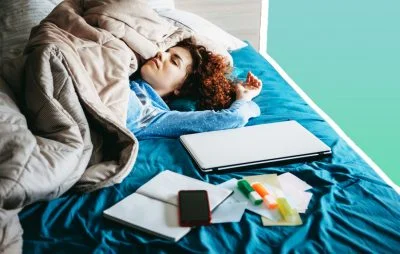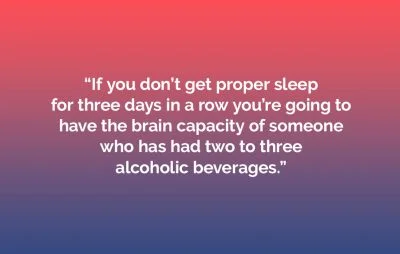
For many young college students, those early days in their dorms mark the first time their parents aren’t checking that they’re home for the night and in bed at a “decent” hour. This newfound freedom brings an onslaught of obstacles college students face, from peer pressure to party at all hours of the night, to pulling all-nighters while studying for a major exam the next day. Lack of sleep in college, along with diet changes, social pressures, a new routine, and other environmental factors can be exhausting — literally. Here’s how college students can ensure they sleep enough so they can fully enjoy and succeed in everything college life has to offer.
Why Is it so Hard for College Students to Sleep?
While it might be a stereotype that all college students want to stay up all night hanging out with friends or studying, those who don’t fall into that group can still experience difficulty adjusting to college, and therefore sleeping. Some of the causes, according to Dr. Bethany Cook, psychologist and parenting author, include adjusting to “going from living at home to freedom,” new anxieties that might keep them up at night, and pressure from others to go out at night. “It takes them longer to potentially adjust to their [new routine],” Cook says.
“Another factor college students may find challenging is the uncertainty in the world — especially with all the changes over the past two years. What does it all mean? What does the future hold? With everything happening in an ever-changing world, stress is keeping them from having a clearly defined outcome and an answer to why they’re taking the courses they’re taking and how they will transition to the adult world,” says Dr. Patrick Porter, neuroscience expert and founder of BrainTap. “How will they take what they’re learning into real-world situations and take their place in society all while earning a decent living? It’s stressful for our college students today.” Mental health struggles, such as anxiety and depression, can also inhibit sleep and lead to insomnia.
He adds additional factors inhibiting sleep include poor nutrition, such as college students “existing on ramen noodles and Cheetos, soda, and beer,” which would inhibit getting optimal rest. Finally, they might be simply staying up too late and doing difficult tasks like studying chemistry right before bed, preventing the brain from winding down properly.
Technology use may also be at an all-time high during college. Dr. Florencia Segura MD, FAAP, a board-certified pediatrician working at Einstein Pediatrics says, “Technology such as smartphones, social media, and streaming services like Netflix make entertainment available 24/7,” leaving teens struggling to regulate their own technology consumption without the boundaries that may have been in place in their childhood homes.
The Importance of Sleep for College Students
In spite of everything working against college students in their quest for enough sleep, they need it more than ever. Cook explains that around the age many students start college, they are going through a “second developmental burst” and their frontal lobes are still developing. “There’s this pruning in the brain that happens, and decisions aren’t great during this time, and kids and parents have this idea that they are 18 so they are adults — they are not — so it’s important that they recognize that, that they need the sleep space as much as they did as children.” She clarifies that while teens and young adults need sleep as desperately, the duration is shorter than childhood, with 8-9 hours being sufficient in a 24 hour period.
Sleep is also essential for absorbing those lessons students are paying top dollar for.
“I think everyone would agree that a good night’s sleep leaves you feeling a bit sharper, and things seem to come to you a little easier. That’s because with proper sleep you’ve lowered your cortisol and adrenaline levels. High levels of cortisol and adrenaline hamper the capacity of the hippocampus, which is the part of the brain that takes short-term memory (such as what you’ve studied for a test) and stores it so it can be recalled during the testing situation,” Porter says. “If you don’t have proper sleep, this doesn’t happen easily. Studies have found that if you don’t get proper sleep for three days in a row you’re going to have the brain capacity of someone who has had two to three alcoholic beverages.”

Reduced sleep levels can lead to:
- Decreased academic performance, due to an inability to absorb all the material (sometimes due to “cramming” or studying while exhausted, which doesn’t work)
- Inefficient prefrontal lobe development, which is responsible for decision-making
- Short term memory loss or extreme fatigue
- Decreases in mental health, making college students more susceptible to serious mental health conditions
- Increased risk of disease and serious health problems including high blood pressure, diabetes, heart attack, stroke, obesity, reduced immune system function, and lower sex drive
Tips for Getting Enough Sleep in College
Though there are many factors working against college students getting quality sleep, they can work to balance their schedules to ensure optimal sleep health. Well-rested college students enjoy better mental health, social relationships, increased focus for academics, and less irritability, Cook explains.
Here are some tips to try, according to our experts:
- Create a bedtime routine – Cook says dim the lights, spray your favorite scent on your pillow (your brain will eventually associate it with bedtime), and clear your sleep area of electronics. A guided meditation can help you drift off.
- Create separation from schoolwork and sleep time – Falling asleep next to your books is a no-no. Instead, allow for an hour of transition time before dozing off.
- Determine if you are morning or night person – Cook says though you can’t always perfectly control your class schedule, sometimes you can tailor it to your needs.
- Avoid alcohol three hours before bed – Cook adds that energy drinks especially don’t bring the level of focus you think they might, and simply keep the body awake without actually improving focus.
- Exercise regularly and try to sneak in some nutritious foods – both of these factors contribute to getting higher quality sleep, multiple experts explained. However, Segura cautions against workouts right before bedtime, or your adrenaline might still be pumping.
- Wake up earlier to do homework rather than cramming at night – Cook says you aren’t coding the information properly without sleep anyway.
- Make your sleeping environment comfortable for you – Work with your roommate to prevent interruptions, keep the room cool and dark, and incorporate any other routines that improve your sleep.
- Confront your worries during the day: Cook says a journal can help you leave those worries in the daytime and move more easily into a restful sleep.
- Don’t go overboard on the naps – short power naps, such as 20 minutes to an hour, can help you “catch up” on sleep, but if you are pushing into multiple hours, you are messing up your circadian rhythms, Cook says.
- Avoid late night snacks (but if you can’t, choose one of these).
- Ask for help when you need it – From mental to physical healthcare, some college students aren’t getting the support they need. Reach out to your university’s healthcare center for both sleep-specific and mental health services.
- Reframe sleep as an investment – Segura explains that it’s a protective factor for mental health, and it ensures your best mood and performance during your waking hours.
- Drink half of your body weight in water in milliliters – Porter says your brain is like a “hydro-engine” and needs plenty of water to function properly, including for sleep. So if you weigh 150 pounds, you would drink 75 ml per day.
- Check your schedule for the day two hours before bedtime, not right before falling asleep, Porter says, to ensure you have everything ready and to reduce stress and anxiety.
- Honor your body through “three waves of wellness” – Porters says movement, healthy eating, and keeping your brain fit through mindfulness and relaxation exercises are all essential for great sleep.
Last Word from Sleepopolis
Sleep is essential, but can be hard to achieve during the college years. If you find yourself struggling with mental health concerns that are pushing into your sleep time, such as insomnia, you should reach out to a medical professional for guidance. Often your lifestyle and environment play a large role in getting optimal sleep, and some minor routine changes can have a large impact. While it may seem like just four years of your life, it’s four years that matter to your physical and emotional health, and academic success, all of which have a massive impact on your present and your future.

























